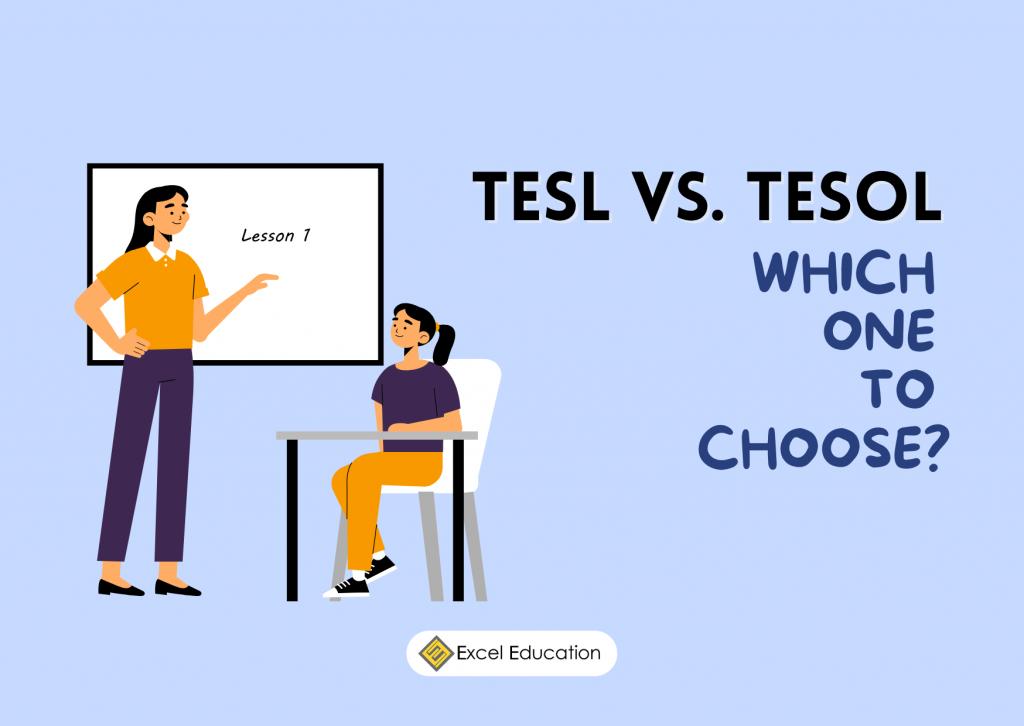
Has English always been your forte? Have you always enjoyed the simple joy of teaching others? Then, I believe this article right here has reached its targeted audience; you.
Surely, you’ve heard of TESL/TESOL once or twice in your life, especially when brought up in topics related to education. You have an idea of what it is, that it has something to do with teaching English, but there’s so many of them so which certificate is the right one for you?
TESL, TEFL AND TESOL: What’s the Difference?
If you’re new to this, it’s fairly easy to get these three acronyms confused at first, so here’s a brief explanation to help you differentiate all of them
- TESL (Teaching English as a Second Language) is for teaching learners in countries where English is not the first language but is still widely used nationwide (e.g. Malaysia, Philippines).
- TEFL (Teaching English as a Foreign Language) focuses on teaching English in countries where English is not the primary language nor is it used on a common basis (e.g. Korea, France, Dubai).
- TESOL (Teaching English to Speakers of Other Languages) is the umbrella term that covers both TEFL and TESL.
TESL vs. TESOL: Which One is For You?
#1 TESL
What is TESL?
TESL is an acronym for Teaching English as a Second Language. It basically means teaching English in countries where English is not the first language but is still used on a nationwide scale. We don’t have to look very far for a good example since it’s right in front of us; Malaysia. Bahasa Melayu is the national language but English is still a frequent option of choice when it comes to daily interactions for almost anything.
TESL is also applied to teaching foreign learners in countries with English as its first language, for instance, teaching English to foreign students living in Australia or the United Kingdom.
What do you study in TESL?
Here’s a brief list of subjects that you’d find yourself learning in a TESL Degree:
- Introduction to Literature
- Introduction to Linguistics
- Morphology & Syntax
- English for Employment
- Language Teaching Methodologies
What can you do with a TESL certification?
A TESL certification sounds great and all, but what can you actually do with one? A TESL graduate is qualified to teach English as a second language in public and private schools in Malaysia.
Some of your career options would be:
- English Language Teacher (Primary/Secondary School)
- English Tutor (Tuition Centres)
Of course, teachers and tutors aren’t all that one can opt for with a TESL certification. You can also pursue alternative careers outside of the teaching field:
- Journalist/Editor
- Transcriber
- Copywriter (Advertising/Digital Marketing)
- Guidance Counsellor
- Marketing Executive
#2 TESOL
What Is TESOL?
TESOL stands for Teaching English to Speakers of Other Languages. Put simply, it refers to teaching English to non-native English speakers that live in English-speaking countries or those situated abroad. This also means that a TESOL certification provides you with more flexibility considering it allows you to teach English in both English and non-English speaking countries.
As mentioned, TESOL umbrellas both TESL and TEFL (Teaching English as a Foreign Language). You may hear people saying that TESOL and TEFL have little to no difference since both acronyms literally mean the same thing; teaching English to non-native speakers.
If you come across references to ESL teaching certificates for teaching English overseas, a TEFL certification and a TESOL certification are the same. The terms are interchangeable.
What Do You Study in TESOL?
Subjects you’d find in TESOL courses may vary according to the institution of choice. Nonetheless, here are some common listings you can expect:
- Language Learning Theory
- Cultural Barriers in Language Instruction
- Cultural Context Comprehension Training
- Subject Sensitive Training Courses
What can you do with a TESOL certification?
By now, you’re aware of the fact that a TESOL certification grants you the capability of teaching English to non-native English speakers, regardless of where they are situated.
Naturally, you’ll be presented with more opportunities of teaching ESL no matter where your career path may take you so flexibility is a luxury at your disposal.
These are examples of careers you can explore, but are not limited to:
- English Language Teacher (Local/International Based)
- Online English Tutor (Freelancing)
- Private English Tutor
- Foreign language translator
General Entry Requirements to Study TESL/TESOL in Malaysia
To be passionate about teaching English is commendable, but for this particular field, you need to possess the academic excellence to show that you’re capable of doing exactly that; teaching!
STPM | Minimum of 2Cs |
Foundation/Pre-University/Matriculation | Minimum CGPA of 2.00 |
UEC | Minimum of 5Bs |
Diploma | Minimum CGPA of 2.00 |
MUET | Band 4 |
*The requirements may vary among universities, for enquiries on other entry requirements, contact us!
Top Universities to Study TESL/TESOL in Malaysia 2022
#1 SEGi University

This programme is designed with the purpose of preparing students to meet demands within the teaching profession for both public and private institutions. An excellent opportunity for non-graduate teachers, school leavers, and those interested in the teaching field to gain a solid command of the knowledge and skills needed for an educator.
Programme Name | Duration | Intakes |
Bachelor of Education (Hons) | 3 Years | January, April, June, August, September, October |
For more information on course structure, entry requirement, duration, fees and scholarship availability offered at SEGi University, contact us!
#2 Taylor’s University

This three-year programme is ensured to instil sound practical and professional knowledge, skills and predispositions of classroom teaching based on a philosophical, theoretical and conceptual understanding of education.
Programme Name | Duration | Intakes |
Bachelor of Education (Hons) | 3 Years | January, March, August |
For more information on course structure, entry requirement, duration, fees and scholarship availability offered at Taylor’s University, contact us!
#3 University of Nottingham

First year modules of this programme will serve as the introduction to the foundation of education through various contexts. The knowledge and understanding gained will be further developed in your second year. By your third year, you will pick up specialised modules related to your pathway. Lastly, your teaching practical starts in your fourth year.
Programme Name | Duration | Intakes |
Bachelor of Education (Hons) (TESOL) | 4 Years | September |
For more information on course structure, entry requirement, duration, fees and scholarship availability offered at University of Nottingham, contact us!
#4 HELP University

This programme will equip graduates with the necessary knowledge and skills required for effecting teaching of English as a Second Language. After all, English is the lingua franca for commerce, science, communications and technology. Here at HELP, students will be led to greater heights in their pursuit of teaching the English language.
Programme Name | Duration | Intakes |
Bachelor of Education (TESL) | 3 Years | January, May, August |
For more information on course structure, entry requirement, duration, fees and scholarship availability offered at HELP University, contact us!
Recommended Articles to Read
About the Author

Elijah H.
diploma graduate of UOW Malaysia.
ardent lover of the moon, literature, and all things sullen. | undead poet

